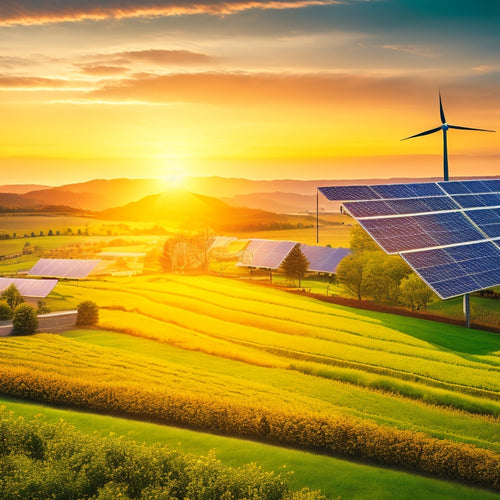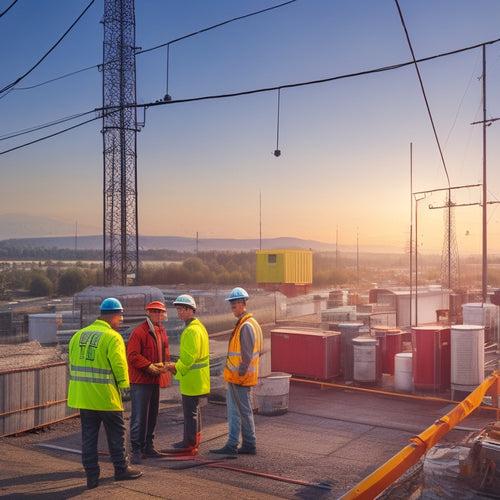
Best Energy Efficiency Solutions for Reducing Your Carbon Footprint
Share
To reduce your carbon footprint effectively, consider implementing energy audits to identify waste and invest in Energy Star appliances for significant savings on bills. Switch to LED lighting to cut energy use by 75%. Smart home automation can optimize consumption, saving you up to 30% on heating and cooling. Additionally, upgrading insulation can enhance performance by 20-30%. These solutions don't just lower utility costs; they also contribute to environmental conservation and increase your property value. By making informed choices today, you set the stage for a sustainable tomorrow—there's a lot more you can investigate to maximize your impact.
At a Glance
- Conduct energy audits to identify wasteful practices and areas for improvement in energy usage to reduce your carbon footprint.
- Upgrade to energy-efficient appliances, such as Energy Star models, which conserve energy and lower utility bills significantly.
- Implement smart home automation systems to monitor and control energy consumption, leading to considerable savings and reduced carbon emissions.
- Enhance insulation in your home to achieve a 20-30% reduction in energy consumption, improving overall energy performance and sustainability.
- Invest in renewable energy sources like solar panels to decrease reliance on fossil fuels and further minimize your carbon footprint.
Proven Long-Term Cost Savings
When you invest in energy efficiency solutions, you can expect lower utility bills that directly increase your monthly savings.
Implementing home solar panel kits can further enhance these savings by reducing grid reliance and allowing you to sell excess energy back to the grid, resulting in significant ROI through savings and incentives.
Additionally, enhancing your property's energy performance often leads to increased property value, making it a smart financial decision.
Lower Utility Bills
Numerous studies have shown that improving energy efficiency can lead to markedly lower utility bills, translating into proven long-term cost savings for households and businesses alike. By conducting energy audits, you can identify inefficiencies in your energy usage and pinpoint areas for improvement. This proactive approach not only helps you save money but also enables you to make informed decisions about your energy consumption.
Implementing simple behavioral changes can further amplify these savings. For instance, adjusting your thermostat by just a few degrees or using energy-efficient appliances can greatly reduce your monthly expenses. These small shifts in your routine not only lighten your bills but also contribute to a more sustainable lifestyle.
Moreover, these savings compound over time. When you invest in energy-efficient solutions, like LED lighting or proper insulation, you're not just cutting costs in the short term—you're laying the foundation for substantial financial relief in the years to come.
Increased Property Value
Investing in energy efficiency not only lowers utility bills but can also considerably increase your property value. As you make upgrades, you'll find that energy-efficient features are becoming essential in today's property market trends. Buyers are increasingly seeking homes with lower energy consumption, which can lead to higher selling prices and quicker sales.
Understanding home appraisal factors is key. Appraisers often consider energy-efficient systems—like solar panels, efficient HVAC systems, and superior insulation—when determining a home's value. These investments not only save on bills but also enhance your property's appeal.
Here's a quick look at how energy efficiency impacts property value:
| Energy Efficiency Upgrade | Potential Value Increase | Long-Term Savings |
|---|---|---|
| Solar Panels | 4-5% | $1,000+/year |
| High-Efficiency HVAC | 3-4% | $500+/year |
| Insulation Improvements | 2-3% | $300+/year |
| Energy Star Appliances | 1-2% | $200+/year |
Incorporating these upgrades not only enhances your living experience but secures your place in a competitive market. By prioritizing energy efficiency, you're making a sound financial decision for your future.
Environmental Impact Reduction
By incorporating renewable energy sources and energy-efficient appliances, you can greatly reduce your environmental impact.
Utilizing solar panels not only lessens your carbon footprint but also promotes a sustainable future.
These solutions, such as high-efficiency panels, are vital for both individual responsibility and collective progress in combating climate change.
Adopting these practices is essential for both individual responsibility and collective progress in combating climate change.
Renewable Energy Sources
Renewable energy sources consistently emerge as vital players in the quest to reduce our carbon footprint and combat climate change. By utilizing the power of nature, you can greatly lessen your environmental impact while enjoying the freedom that comes with sustainable energy solutions.
Solar panel innovations, for instance, have made solar energy more efficient and accessible than ever. With advancements in solar technology, you can now generate your own electricity, reducing reliance on fossil fuels and lowering your energy bills.
Similarly, wind turbine advancements have altered the environment of renewable energy. These state-of-the-art turbines capture wind energy more effectively, enabling homes and businesses to tap into a clean, renewable source of power.
By adopting wind energy, you not only support local economies but also contribute to a healthier planet.
Incorporating renewable energy into your life isn't just about environmental responsibility; it's about embracing a future where sustainability and freedom go hand in hand.
By shifting to these energy sources, you can take control of your energy consumption, reduce greenhouse gas emissions, and inspire others to join the movement.
The choice is yours—let's make it a greener one.
Energy-efficient Appliances
When you choose energy-efficient appliances, you're making a significant impact on both your household energy consumption and the environment. These appliances boast energy-efficient designs that not only reduce your electricity bills but also promote sustainability. By investing in energy-efficient options, you're opting for appliances that often feature enhanced durability and appliance longevity, ensuring they serve you well for years to come.
To illustrate the benefits, consider the following table:
| Appliance Type | Energy Savings (Annual) | Lifespan (Years) |
|---|---|---|
| Energy Star Washer | $50 | 10-15 |
| Energy Star Fridge | $80 | 15-20 |
| Energy Star Dishwasher | $35 | 10-12 |
| LED Light Bulbs | $60 | 15-25 |
| Energy Star Oven | $40 | 10-15 |
Key Benefits Overview
When you implement energy efficiency solutions, you not only reduce your carbon footprint but also contribute to a healthier environment.
By shifting to renewable energy sources, homeowners can gain renewable energy independence and considerably lower their energy bills.
You'll find that these measures often lead to considerable cost savings, making it a win-win situation.
Understanding these key benefits can motivate you to take action and adopt sustainable practices.
Environmental Impact Reduction
Implementing energy efficiency solutions not only conserves resources but also greatly reduces your carbon footprint. By adopting sustainable practices in your daily life, you actively contribute to a healthier planet. Every small change, like upgrading to energy-efficient appliances or optimizing your home's insulation, adds up to significant reductions in energy consumption and greenhouse gas emissions.
You might be surprised to learn that energy-efficient systems can drastically lower your demand for fossil fuels, leading to less air pollution and a decrease in habitat destruction. In addition, participating in carbon offsetting initiatives can further enhance your impact. By investing in renewable energy projects or forest conservation, you're helping to balance out the emissions you can't eliminate entirely.
These efforts not only lead to a more sustainable environment but also enable you to take control of your energy use. Embracing energy efficiency means embracing freedom from dependence on non-renewable resources, allowing you to tread lightly on the Earth.
As you make these choices, you're not just improving your immediate surroundings; you're laying the groundwork for a sustainable future for generations to come.
Cost Savings Potential
Investing in energy efficiency solutions can lead to substantial cost savings for both households and businesses. By conducting energy audits, you can identify areas where you're wasting energy and money. Implementing these solutions not only reduces your utility bills, but also enhances the comfort of your living or working space.
Here's a quick look at the potential savings:
| Energy Efficiency Solution | Estimated Savings | Financing Options |
|---|---|---|
| LED Lighting | 75% reduction | Rebates, low-interest loans |
| Smart Thermostats | 10-20% reduction | Tax credits, incentives |
| Insulation Upgrades | 20-30% reduction | Financing programs |
With numerous financing options available, you don't have to bear the upfront costs alone. Many programs offer incentives that make it easier to invest in energy-efficient upgrades. These choices enable you to take control of your energy expenses while making a positive environmental impact.
Selecting Based on Energy Source
When choosing your energy source, it's essential to weigh the benefits of renewable options against the impacts of fossil fuels.
By selecting renewables like solar or wind, you not only reduce your carbon footprint but also support sustainable practices.
Portable power solutions, for example, enable off-grid journeys and equip individuals to investigate remote locations without the constraints of traditional energy sources facilitates spontaneous travel.
Understanding these choices equips you to make informed decisions that contribute to a healthier planet.
Renewable Energy Options
Exploring renewable energy options is essential for selecting the most effective sources to reduce your carbon footprint. By considering various energy sources like solar panels and wind turbines, you can harness nature's power while embracing sustainable practices. Each option has unique benefits: solar panels offer energy independence, while wind turbines can be ideal for open spaces.
Geothermal heating provides an efficient way to regulate your home's temperature, and biomass energy employs organic materials, promoting recycling and reducing waste. Hydroelectric power remains a reliable choice for communities near water sources, contributing to energy storage and stability.
Integrating these renewable solutions into your lifestyle not only aids in carbon offsetting but also aligns with green certifications that enhance your property's value. Participating in community initiatives can amplify your impact, nurturing a collective shift towards sustainability.
Ultimately, the choice of renewable energy source should reflect your values and circumstances, ensuring you contribute to a cleaner environment. Embracing these options enables you to make informed decisions that support both your freedom and the planet's health.
Fossil Fuels Impact
How do fossil fuels truly shape our energy environment and carbon footprint? They're powerful energy sources, but they come with significant environmental costs. You might not realize that every time you choose fossil fuels, you're contributing to greenhouse gas emissions, which are a major driver of climate change. However, there are viable fossil fuel alternatives available that can help you reduce your carbon footprint.
To understand the impact of different energy sources, consider the following table:
| Energy Source | Carbon Emissions (gCO2/kWh) | Fossil Fuel Alternatives |
|---|---|---|
| Coal | 900 | Solar, Wind |
| Natural Gas | 400 | Biomass, Geothermal |
| Oil | 800 | Hydro, Nuclear |
| Renewables | 0-50 | Energy Efficiency Solutions |
Superior Technology Integration
Integrating smart home automation can drastically enhance your energy efficiency while reducing your carbon footprint.
By optimizing energy use through intelligent systems, you can manage lighting, heating, and appliances with ease, ensuring that you're minimizing waste.
Embracing this superior technology not only benefits the environment but also saves you money in the long run.
Smart Home Automation
Smart home automation represents a revolutionary approach to energy efficiency, allowing homeowners to seamlessly manage their energy usage. By integrating smart devices into your daily life, you can take control of your energy consumption and greatly reduce your carbon footprint. These devices not only enhance convenience but also provide real-time energy monitoring, enabling you to make informed decisions about your energy habits.
Consider the following table that highlights the benefits of smart home automation:
| Smart Device | Energy Monitoring Capability | Potential Savings |
|---|---|---|
| Smart Thermostat | Yes | Up to 30% on heating and cooling bills |
| Smart Lighting | Yes | Up to 75% on lighting costs |
| Smart Plugs | Yes | 10-15% on overall energy use |
With such technology at your fingertips, you're not just saving money; you're also contributing to a more sustainable future. Embracing smart home automation gives you the freedom to manage your energy usage efficiently, ensuring you're not only comfortable but also environmentally responsible. Take the leap, and let technology work for you!
Frequently Asked Questions
What Are the Initial Costs of Implementing Energy Efficiency Solutions?
When considering initial investments in energy efficiency solutions, you'll find that while upfront costs may seem high, they lead to significant long-term savings, enabling you to enjoy financial freedom and a more sustainable lifestyle.
How Can I Track My Carbon Footprint Reduction?
To track your carbon footprint reduction, use carbon tracking apps that analyze your emission metrics. Regularly input your data, monitor trends, and adjust your habits for greater freedom in achieving your sustainability goals.
Are There Government Incentives for Energy Efficiency Upgrades?
Yes, there're government incentives for energy efficiency upgrades! You can access federal programs, tax credits, and local rebates. Energy audits help identify improvements, maximizing your savings while enhancing your home's efficiency and sustainability.
How Do Energy-Efficient Solutions Impact Property Value?
In today's property market trends, energy-efficient solutions can enhance your home's value considerably. You'll reap energy efficiency benefits, attracting buyers who prioritize sustainability and lower utility costs, ultimately granting you greater freedom in your investment choices.
Can I Implement These Solutions in Older Buildings?
Absolutely, you can implement retrofit strategies in older buildings. By selecting modern building materials and integrating energy-efficient systems, you enhance performance while preserving character, ultimately increasing value and promoting a sustainable future for your property.
Explore More
Incorporating energy efficiency solutions is like planting a tree; it takes time to grow, but the benefits are immense. By reducing your carbon footprint, you're not just saving on costs, but nurturing a healthier planet for future generations. Studies show that homes implementing these strategies can cut energy bills by up to 30%. So, as you choose your energy solutions, remember: each small step is a seed planted towards a greener, more sustainable future.
Related Posts
-

Net Metering in Renewable Energy's Future
Net metering's future is vital for driving renewable energy growth and financial savings. You can reduce your electri...
-

Smart Home Thermostats to Revolutionize Your Space
Smart home thermostats revolutionize your space by providing precise temperature control and optimizing energy saving...
-

Smart Grid Technology Implementation Challenges
You'll encounter several challenges when implementing smart grid technology, particularly in cost management, scalabi...


